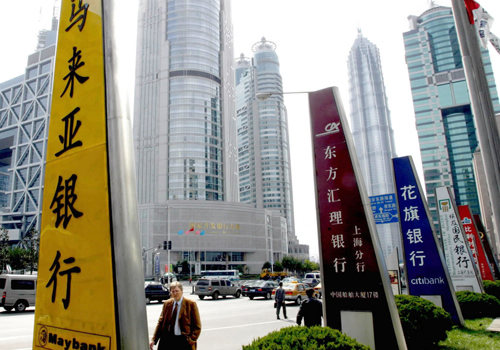|
 |
|
OPENING BRINGS BENEFITS: Lujiazui in Shanghai boasts more than 500 domestic and overseas financial and insurance corporations (XINHUA) |
The Next Steps
Reform and opening up, which propelled China's rapid growth for more than three decades, will continue to underpin China's future development. China will implement a more active opening up strategy and open more areas to the world.
China will continue efforts to promote the world's common development, shoulder obligations and responsibilities within its capabilities and continue to play a constructive role in the global economic community.
It will introduce advanced technology to improve the international competitiveness of its domestic manufacturing industries and move up the value chain in traditional manufacturing sector. It will continue to enhance international economic and technological cooperation and foster the development of modern industries, which feature optimized structure, advanced technology, clean and safe production, high-value products and capability to boost employment.
China will promote the balanced development of foreign trade and attach importance to both imports and exports, boosting imports while stabilizing exports. It will strengthen economic cooperation with countries that have substantial trade deficits with China, and work with them together to resolve trade imbalances.
China will welcome foreign investment in its national strategy of developing the central and western regions and rejuvenating the old industrial bases in the northeast. Foreign investment will also be encouraged in some cultural sectors.
While encouraging the establishment of research and development centers by foreign investors, China will also accelerate its "going global" strategy.
China will continue to build a fair, stable and transparent investment environment, reduce government intervention in microeconomic activities and enhance protection of intellectual property rights.
(Edited excerpts of President Hu Jintao's remarks at the forum for the 10th anniversary of China's accession to the WTO)
China's Contributions
- The total volume of exports and imports ranked second in the world in 2010 from sixth in 2001, being the world's second largest importer and the biggest exporter.
- China imported goods worth of $7.5 trillion in the past 10 years, creating a large number of employment and investment opportunities for its trading partners.
- China attracted $759.5 billion of foreign direct investment in the past decade, ranking first among developing countries.
- China's investment in overseas markets grew at an annual average rate of more than 40 percent during the past decade, reaching $68.8 billion in 2010, ranking the fifth in the world.
- Foreign companies investing in China repatriated $261.7 billion worth of profit since 2001, growing 30 percent each year on average.
- China provided loans worth over 170 billion yuan ($26.15 billion) to foreign countries since 2001; discharged due debts of nearly 30 billion yuan ($4.61billion) of 50 heavily in-debt countries and the least developed countries; pledged zero tariffs to 97 percent of the goods imported from the least developed countries that have established diplomatic relations with
- China; and provided training for more than 60,000 people from 173 developing countries and 13 regional international organizations.
China's Accomplishments
- Total tariff level decreased from 15.3 percent to 9.8 percent, reaching and exceeding WTO's requirement for developing countries.
- China opened 100 service trade departments, close to the level of developed countries.
- China has amended its laws and regulations in accordance with its WTO commitments. The Central Government had cleared more than 2,300 laws and regulations as well as department rules. Local governments had cleared more than 190,000 local rules and regulations. | 